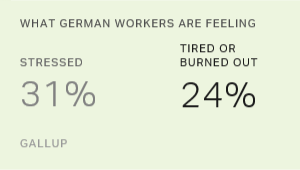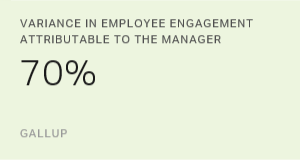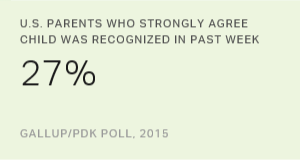Element 4 Recognition and Praise
Explore Gallup's research.

The benefits of individual employee recognition are well known. Learn what happens when you start recognizing employees on the team level.

Learn how to lead productive and engaging meetings. The kind of meetings that make people actually want to show up.

Worker burnout and stress cost German employers more than 9 billion euros in lost productivity annually.

The holiday season comes with a heightened sense of urgency and even chaos for employees, especially those in retail.
Burnout affects an estimated 2.7 million German employees. Better managers are the key to preventing this feeling.
35% of U.S. Managers Are Engaged in Their Jobs
U.S. employees with female bosses are more engaged than employees with male bosses. Female managers are also more engaged at work.
Personalized feedback and recognition aren't just "frills" that make workers feel good about themselves -- they're crucial predictors of positive performance. Yet a global study of employee engagement shows that they're among the lowest rated workplace elements worldwide.
How does employee engagement move through an organization? Does it begin in the executive suite and move down through managers to frontline workers? Or does it come from all different directions? Gallup researchers set out to tackle these essential leadership questions.
Employees who report they're not adequately recognized at work are three times more likely to say they'll quit in the next year. That's a shame, as this problem is completely avoidable. Frequent recognition is a surefire -- not to mention affordable -- way to boost employee engagement, and to keep good people.
This supervisor in Poland had many obstacles to overcome, not least of which was being a diminutive woman in a paper plant dominated by burly men. What's more, a palpable malaise permeated the place. But by giving her employees something they hadn't received before -- large doses of praise and recognition -- she turned around this formerly government-run warehouse. Her approach was downright radical.
The number-one reason people leave their jobs is because they "don't feel appreciated," according to the U.S. Department of Labor. What's a manager to do? Start by offering praise to employees that's individualized, deserved, and specific.
Disengaged and poorly managed workers could be chasing business out the door, write the authors of How Full Is Your Bucket? Positive Strategies for Work and Life. What's more, workgroups drained by excessive negativity also have higher turnover, more accidents on the job, and lower customer satisfaction, innovation, and quality scores.
Research shows they are critical to increasing employee productivity and engagement, according to the authors of How Full Is Your Bucket? Positive Strategies for Work and Life. What's more, people who receive regular recognition and praise are more likely to stay with their organization, receive higher loyalty and satisfaction scores from customers, and have fewer accidents on the job.
Dietitians at St. Mary's/Duluth Clinic Health System were at a crossroads. Their team didn't have enough people and felt ignored. Their workspace was "dismal." A few were quietly threatening to resign. Here's how one manager attacked this problem and raised employee engagement from average to extraordinary -- in just a year.
The best sales managers know how to provide their star performers with just the right rewards to feed that drive for success. In fact, finding the perfect "fit" between motivation and rewards may be the key to focusing great sales reps toward even greater achievements -- or sending them into a slump. Here are some strategies to motivate your sales stars.
The best sales managers know how to provide their star performers with just the right rewards to feed that drive for success. In fact, finding the perfect "fit" between motivation and rewards may be the key to focusing great sales reps toward even greater achievements -- or sending them into a slump. Here are some strategies to motivate your sales stars.
